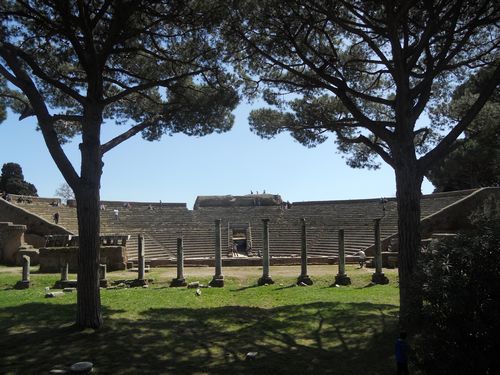A beautiful sunny day as spring is blossoming, comfortable clothing, free time and wish to travel back almost 2000 years are the ingredients composing a visit to Ostia Antica excavations. Ostia Antica is one of the best sights to see in Rome !
Ostia Antica is located not far from Rome, and you can reach it from the San Paolo station (metro B Piramide) take the train Roma-Lido and stop at Ostia Antica or take the train G.R.A (Grande Raccordo Anulare) exit 28 to take the Via del Mare or the Via Ostense Ostiense (for buses only Via Ostiense is available) to Ostia Antica.
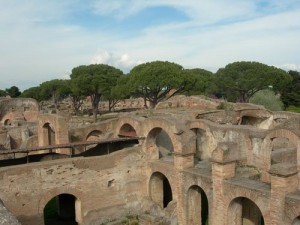
Once you are in front of the ticket office, you can buy an audioguide or a sitemap before you can really immerse yourself in the Roman reality of the second century AD
Ostia Antica offers five different paths, according to what historic or cultural aspect you are more interested in :
I tried to see most of them, 3 out of 5 :
1. Lungo il Decumano
2. Da Porta Marina
3. The Forum
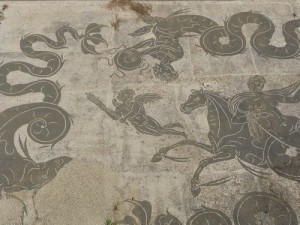
You enter to Lungo il Decumano ( the principal path) through the necropolis of the city. In Ancient times, It was the place where the dead were buried. The yellow and red brick buildings are separated by pumice stones you can see. Then over the arches still in a good shape, you can see the tombs/ sepulchre and cells in which urns were stored.The necropolis was always located outide of the surrounding wall of a city. Therefore, you need to continue on a few hundred meters to find the first stores containing provisions for the city.
Here between the preserved mosaics and the high staircase it will be possible to climb on the roofs of some buildings to admire the panorama below and to see deeper in the heart of the ancient city.
The city was built around the fifth century BC by Anco Marcioat. From the beginning, itwas considerated as a castrum which is a simple fortified citadel. Because of its proximity to the sea the population grew.
People moved into the city and many came and need places to stay while doing business. So to accommodate this expansion the walls were extended.
Along the guild road, you can in fact see various trading posts and places where a trader could stop for food and refreshments. The plaques placed on some buildings give us a glimpse of what actually was there in the past.
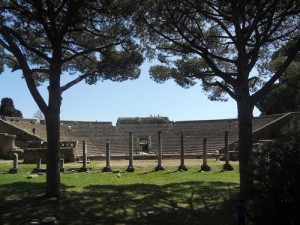
Wells and fountains, benches and statues are visible to our eyes. And the Earth and Gray Stone street leads to the temple of Ceres. In front of this temple you can see the Ostia theatre with its perfectly polished colonnades.
It is impossible to resist to the temptation of taking the stairs to the top of Ostia Antica. Because from this point, you can enjoy a wonderful panorama. Between blossoming trees, buildings and streets, the city of Ostia Antica with its Roman tradition still appears today in all its beauty. It seems still possible to enjoy a glimpse of the life at this time.
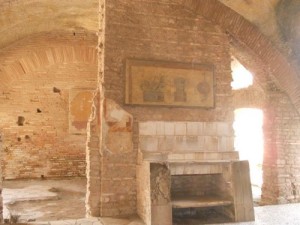
You can see this slice of ancient life from the holy buildings like il Capitolium,ancient temple of the city, to the most common places as il Termopholium which could actually be defined today as a restaurant or a pub. You can still perfectly see the pantry, the kitchen, and also the garden where meals were served. And of course, you should not miss: the area of “foriche” , the ancient Roman toilets, the popular “ Taberna of Pscidenvoli” and then the area of the “seven wise men”, the thermal baths in which were discussed politics and social developments.
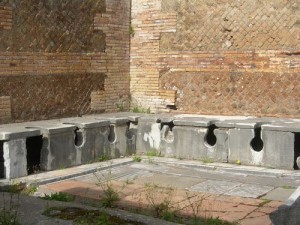
If you are interested in exploring more in-depth the houses and buildings of the site, the ones that still have frescoes can be visited. However, be advised that an advance reservation is required to visit them.
Ostia Antica is definitely an experience worth trying, and you can really say after you spent a day there, in fact you spent a day in Ancient Rome !


